Ethical Issues in Human Nutrition: A Food Ethics Report
VerifiedAdded on 2020/04/13
|7
|1828
|237
Report
AI Summary
This report, titled 'Food Ethics - Ethical issues for human nutrition,' delves into the moral consequences of food choices, encompassing production and consumption, within the framework of global food security and sustainable development. It addresses the ethical dilemmas of providing sufficient, safe, and nutritious food to all, considering challenges like malnutrition, obesity, and environmental impacts. The report includes an annotated bibliography that highlights the need for ethical considerations in food systems, addressing issues such as equitable food distribution, animal welfare, and the trade-offs between environmental sustainability and individual dietary needs. The report emphasizes the urgent need to tackle these complex issues to achieve global food security and emphasizes the need for ethical standards and strong values in setting nutrition as the highest priority to achieve global security in food.
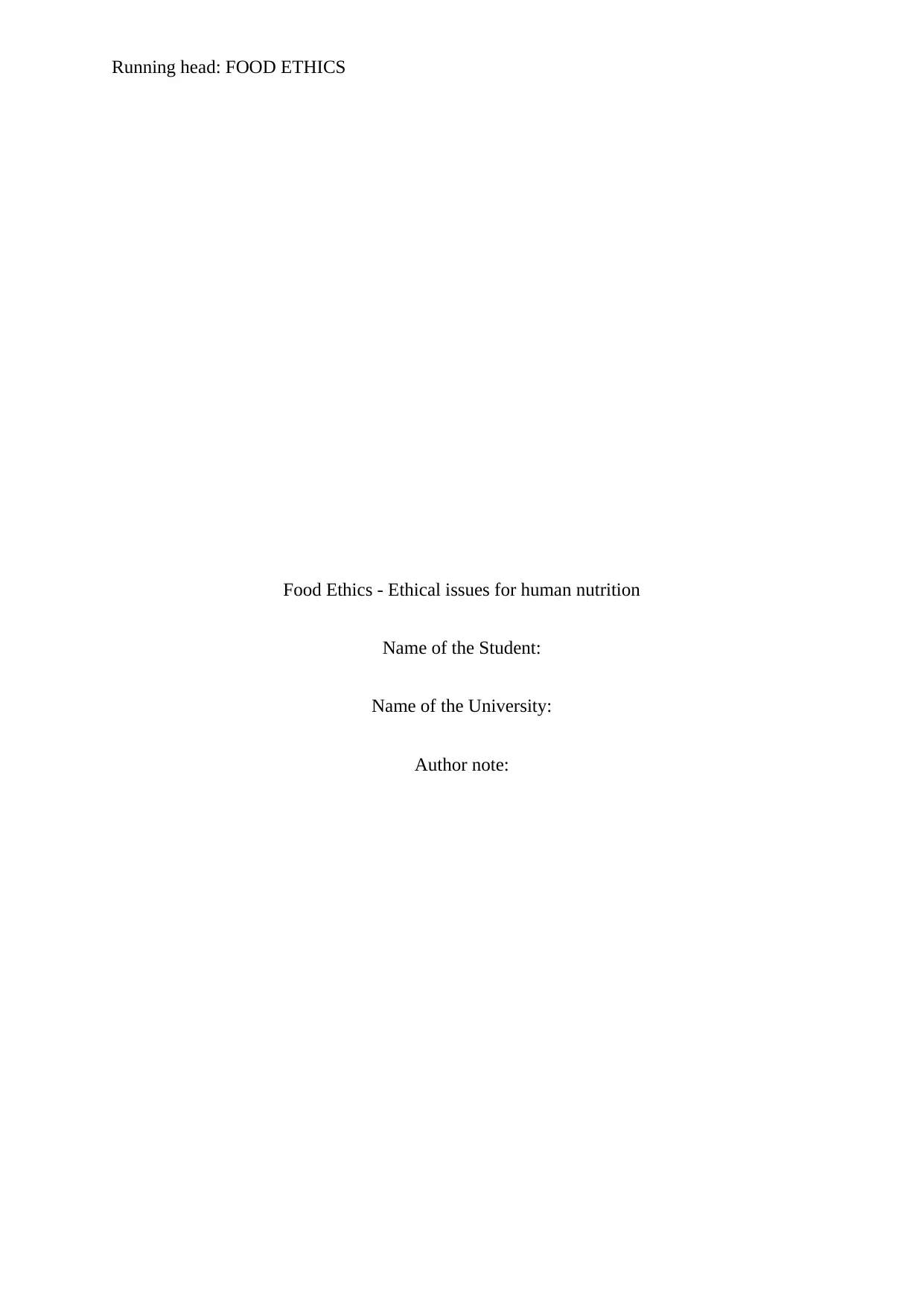
Running head: FOOD ETHICS
Food Ethics - Ethical issues for human nutrition
Name of the Student:
Name of the University:
Author note:
Food Ethics - Ethical issues for human nutrition
Name of the Student:
Name of the University:
Author note:
Paraphrase This Document
Need a fresh take? Get an instant paraphrase of this document with our AI Paraphraser
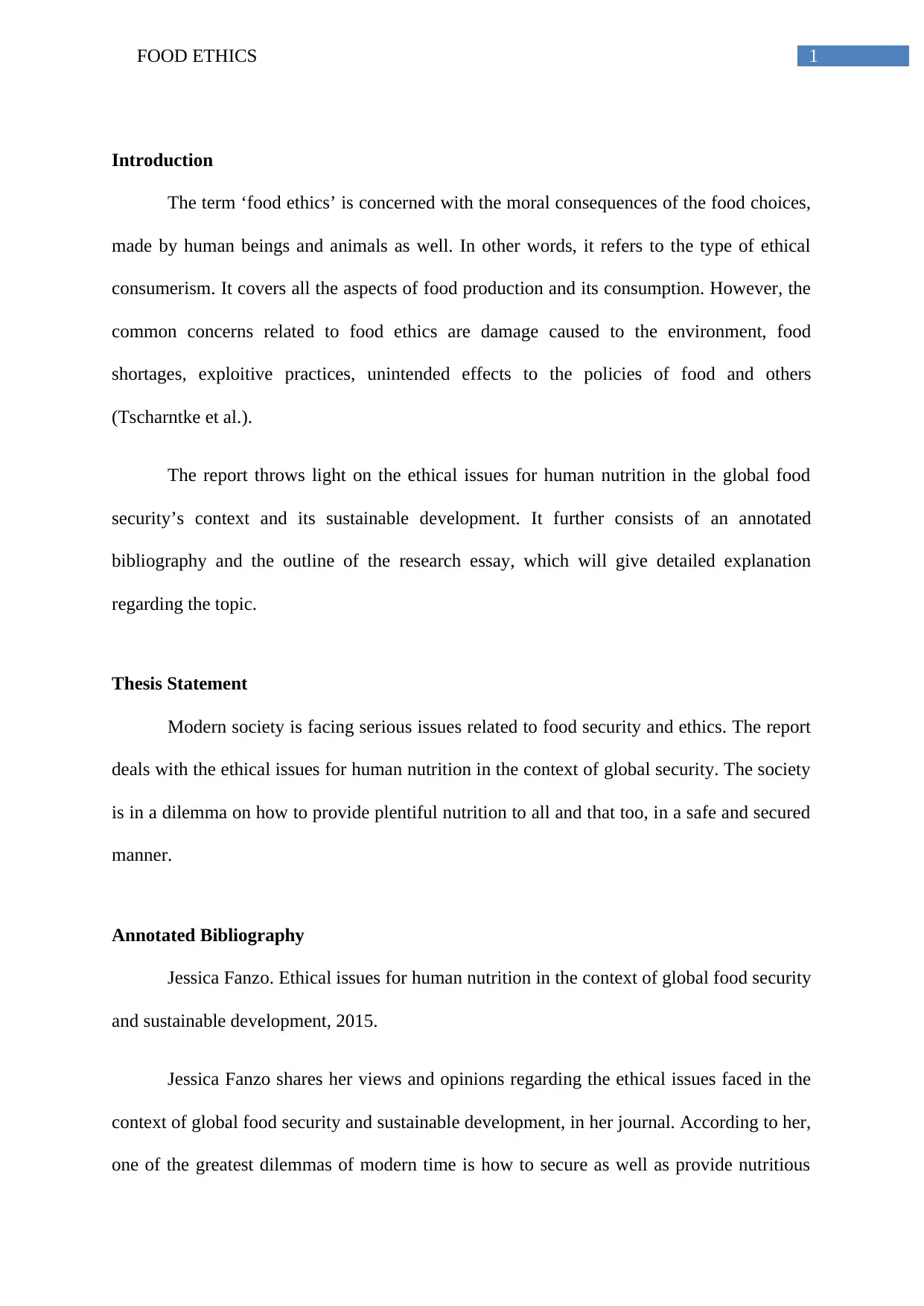
1FOOD ETHICS
Introduction
The term ‘food ethics’ is concerned with the moral consequences of the food choices,
made by human beings and animals as well. In other words, it refers to the type of ethical
consumerism. It covers all the aspects of food production and its consumption. However, the
common concerns related to food ethics are damage caused to the environment, food
shortages, exploitive practices, unintended effects to the policies of food and others
(Tscharntke et al.).
The report throws light on the ethical issues for human nutrition in the global food
security’s context and its sustainable development. It further consists of an annotated
bibliography and the outline of the research essay, which will give detailed explanation
regarding the topic.
Thesis Statement
Modern society is facing serious issues related to food security and ethics. The report
deals with the ethical issues for human nutrition in the context of global security. The society
is in a dilemma on how to provide plentiful nutrition to all and that too, in a safe and secured
manner.
Annotated Bibliography
Jessica Fanzo. Ethical issues for human nutrition in the context of global food security
and sustainable development, 2015.
Jessica Fanzo shares her views and opinions regarding the ethical issues faced in the
context of global food security and sustainable development, in her journal. According to her,
one of the greatest dilemmas of modern time is how to secure as well as provide nutritious
Introduction
The term ‘food ethics’ is concerned with the moral consequences of the food choices,
made by human beings and animals as well. In other words, it refers to the type of ethical
consumerism. It covers all the aspects of food production and its consumption. However, the
common concerns related to food ethics are damage caused to the environment, food
shortages, exploitive practices, unintended effects to the policies of food and others
(Tscharntke et al.).
The report throws light on the ethical issues for human nutrition in the global food
security’s context and its sustainable development. It further consists of an annotated
bibliography and the outline of the research essay, which will give detailed explanation
regarding the topic.
Thesis Statement
Modern society is facing serious issues related to food security and ethics. The report
deals with the ethical issues for human nutrition in the context of global security. The society
is in a dilemma on how to provide plentiful nutrition to all and that too, in a safe and secured
manner.
Annotated Bibliography
Jessica Fanzo. Ethical issues for human nutrition in the context of global food security
and sustainable development, 2015.
Jessica Fanzo shares her views and opinions regarding the ethical issues faced in the
context of global food security and sustainable development, in her journal. According to her,
one of the greatest dilemmas of modern time is how to secure as well as provide nutritious
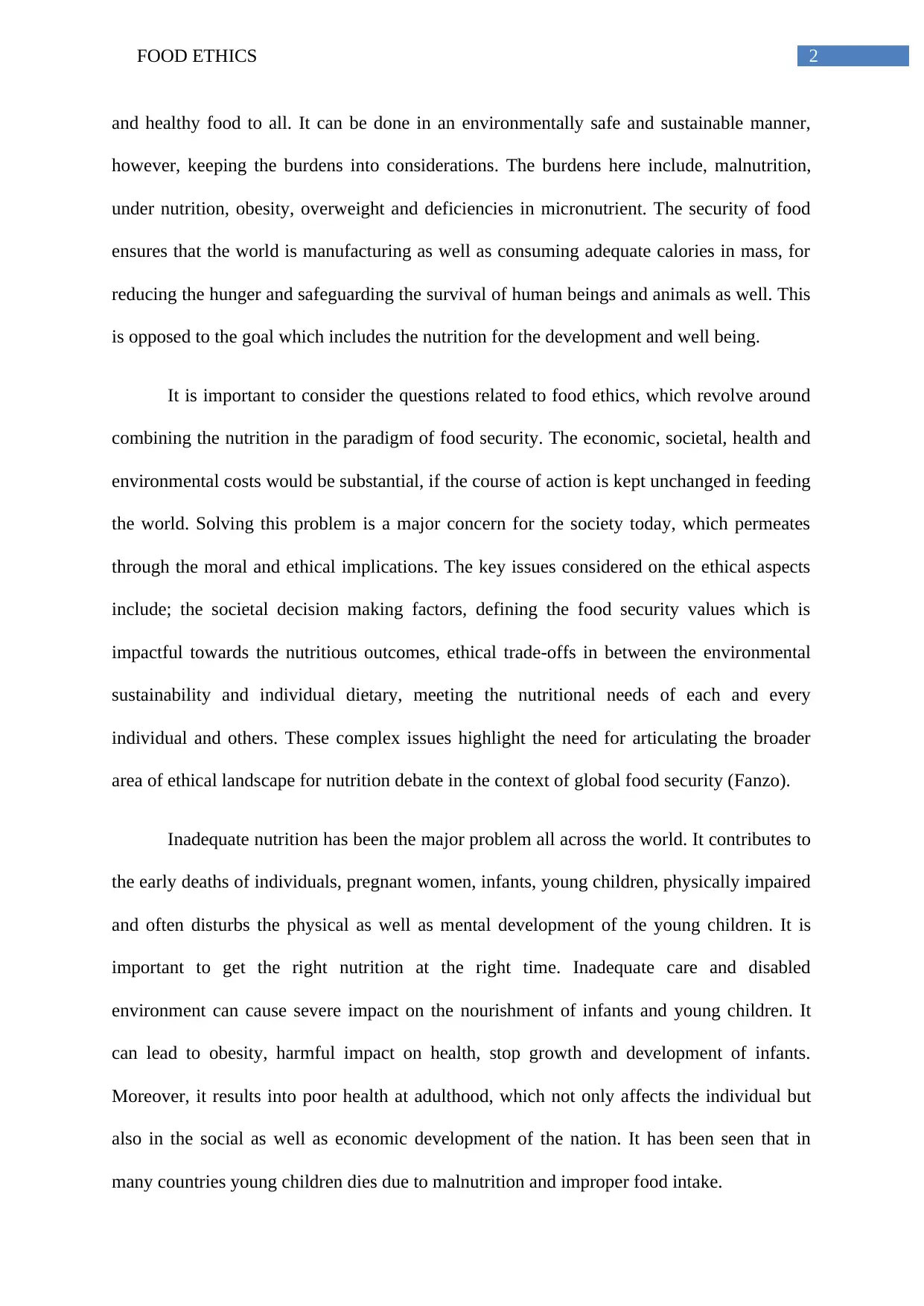
2FOOD ETHICS
and healthy food to all. It can be done in an environmentally safe and sustainable manner,
however, keeping the burdens into considerations. The burdens here include, malnutrition,
under nutrition, obesity, overweight and deficiencies in micronutrient. The security of food
ensures that the world is manufacturing as well as consuming adequate calories in mass, for
reducing the hunger and safeguarding the survival of human beings and animals as well. This
is opposed to the goal which includes the nutrition for the development and well being.
It is important to consider the questions related to food ethics, which revolve around
combining the nutrition in the paradigm of food security. The economic, societal, health and
environmental costs would be substantial, if the course of action is kept unchanged in feeding
the world. Solving this problem is a major concern for the society today, which permeates
through the moral and ethical implications. The key issues considered on the ethical aspects
include; the societal decision making factors, defining the food security values which is
impactful towards the nutritious outcomes, ethical trade-offs in between the environmental
sustainability and individual dietary, meeting the nutritional needs of each and every
individual and others. These complex issues highlight the need for articulating the broader
area of ethical landscape for nutrition debate in the context of global food security (Fanzo).
Inadequate nutrition has been the major problem all across the world. It contributes to
the early deaths of individuals, pregnant women, infants, young children, physically impaired
and often disturbs the physical as well as mental development of the young children. It is
important to get the right nutrition at the right time. Inadequate care and disabled
environment can cause severe impact on the nourishment of infants and young children. It
can lead to obesity, harmful impact on health, stop growth and development of infants.
Moreover, it results into poor health at adulthood, which not only affects the individual but
also in the social as well as economic development of the nation. It has been seen that in
many countries young children dies due to malnutrition and improper food intake.
and healthy food to all. It can be done in an environmentally safe and sustainable manner,
however, keeping the burdens into considerations. The burdens here include, malnutrition,
under nutrition, obesity, overweight and deficiencies in micronutrient. The security of food
ensures that the world is manufacturing as well as consuming adequate calories in mass, for
reducing the hunger and safeguarding the survival of human beings and animals as well. This
is opposed to the goal which includes the nutrition for the development and well being.
It is important to consider the questions related to food ethics, which revolve around
combining the nutrition in the paradigm of food security. The economic, societal, health and
environmental costs would be substantial, if the course of action is kept unchanged in feeding
the world. Solving this problem is a major concern for the society today, which permeates
through the moral and ethical implications. The key issues considered on the ethical aspects
include; the societal decision making factors, defining the food security values which is
impactful towards the nutritious outcomes, ethical trade-offs in between the environmental
sustainability and individual dietary, meeting the nutritional needs of each and every
individual and others. These complex issues highlight the need for articulating the broader
area of ethical landscape for nutrition debate in the context of global food security (Fanzo).
Inadequate nutrition has been the major problem all across the world. It contributes to
the early deaths of individuals, pregnant women, infants, young children, physically impaired
and often disturbs the physical as well as mental development of the young children. It is
important to get the right nutrition at the right time. Inadequate care and disabled
environment can cause severe impact on the nourishment of infants and young children. It
can lead to obesity, harmful impact on health, stop growth and development of infants.
Moreover, it results into poor health at adulthood, which not only affects the individual but
also in the social as well as economic development of the nation. It has been seen that in
many countries young children dies due to malnutrition and improper food intake.
⊘ This is a preview!⊘
Do you want full access?
Subscribe today to unlock all pages.

Trusted by 1+ million students worldwide
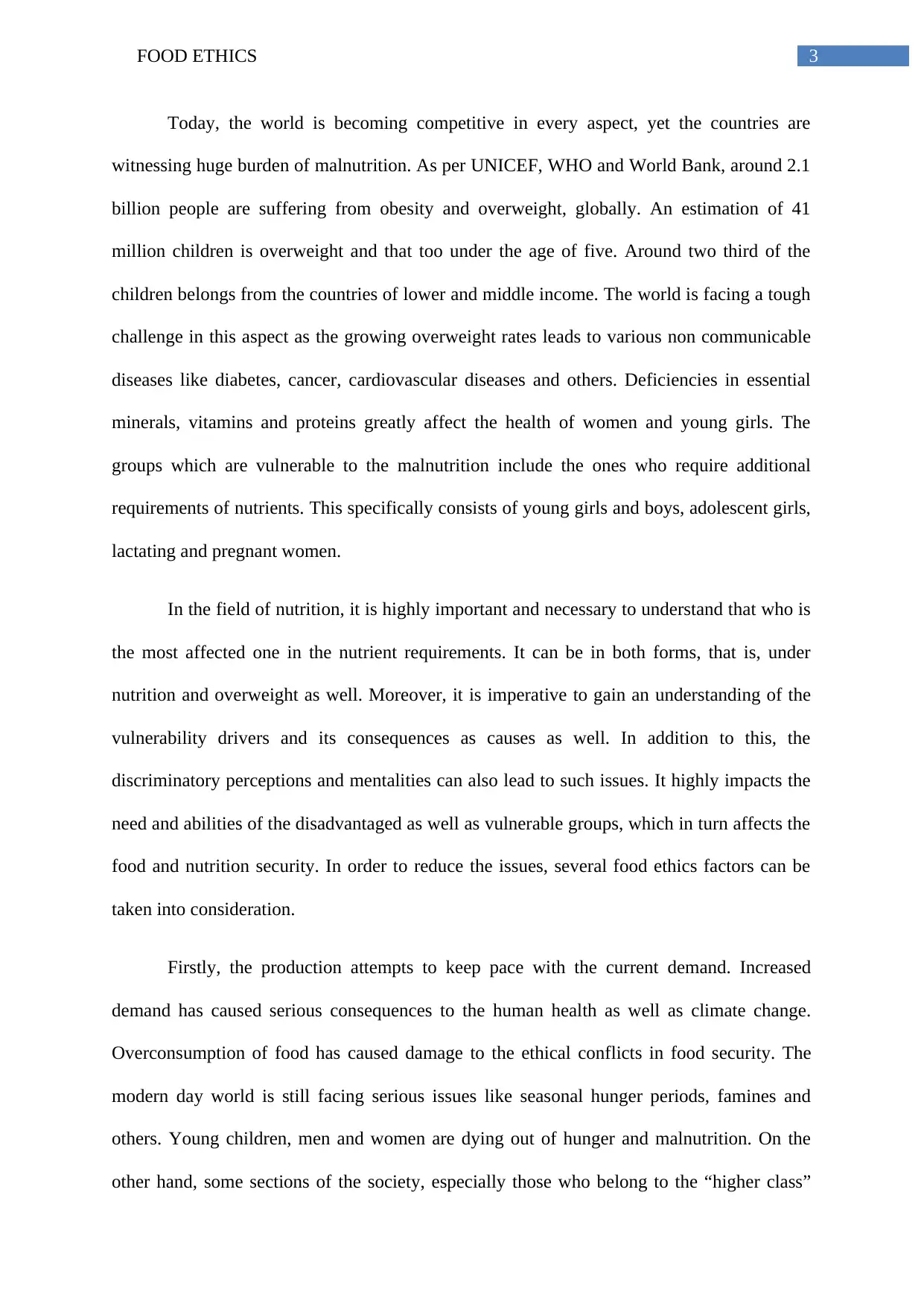
3FOOD ETHICS
Today, the world is becoming competitive in every aspect, yet the countries are
witnessing huge burden of malnutrition. As per UNICEF, WHO and World Bank, around 2.1
billion people are suffering from obesity and overweight, globally. An estimation of 41
million children is overweight and that too under the age of five. Around two third of the
children belongs from the countries of lower and middle income. The world is facing a tough
challenge in this aspect as the growing overweight rates leads to various non communicable
diseases like diabetes, cancer, cardiovascular diseases and others. Deficiencies in essential
minerals, vitamins and proteins greatly affect the health of women and young girls. The
groups which are vulnerable to the malnutrition include the ones who require additional
requirements of nutrients. This specifically consists of young girls and boys, adolescent girls,
lactating and pregnant women.
In the field of nutrition, it is highly important and necessary to understand that who is
the most affected one in the nutrient requirements. It can be in both forms, that is, under
nutrition and overweight as well. Moreover, it is imperative to gain an understanding of the
vulnerability drivers and its consequences as causes as well. In addition to this, the
discriminatory perceptions and mentalities can also lead to such issues. It highly impacts the
need and abilities of the disadvantaged as well as vulnerable groups, which in turn affects the
food and nutrition security. In order to reduce the issues, several food ethics factors can be
taken into consideration.
Firstly, the production attempts to keep pace with the current demand. Increased
demand has caused serious consequences to the human health as well as climate change.
Overconsumption of food has caused damage to the ethical conflicts in food security. The
modern day world is still facing serious issues like seasonal hunger periods, famines and
others. Young children, men and women are dying out of hunger and malnutrition. On the
other hand, some sections of the society, especially those who belong to the “higher class”
Today, the world is becoming competitive in every aspect, yet the countries are
witnessing huge burden of malnutrition. As per UNICEF, WHO and World Bank, around 2.1
billion people are suffering from obesity and overweight, globally. An estimation of 41
million children is overweight and that too under the age of five. Around two third of the
children belongs from the countries of lower and middle income. The world is facing a tough
challenge in this aspect as the growing overweight rates leads to various non communicable
diseases like diabetes, cancer, cardiovascular diseases and others. Deficiencies in essential
minerals, vitamins and proteins greatly affect the health of women and young girls. The
groups which are vulnerable to the malnutrition include the ones who require additional
requirements of nutrients. This specifically consists of young girls and boys, adolescent girls,
lactating and pregnant women.
In the field of nutrition, it is highly important and necessary to understand that who is
the most affected one in the nutrient requirements. It can be in both forms, that is, under
nutrition and overweight as well. Moreover, it is imperative to gain an understanding of the
vulnerability drivers and its consequences as causes as well. In addition to this, the
discriminatory perceptions and mentalities can also lead to such issues. It highly impacts the
need and abilities of the disadvantaged as well as vulnerable groups, which in turn affects the
food and nutrition security. In order to reduce the issues, several food ethics factors can be
taken into consideration.
Firstly, the production attempts to keep pace with the current demand. Increased
demand has caused serious consequences to the human health as well as climate change.
Overconsumption of food has caused damage to the ethical conflicts in food security. The
modern day world is still facing serious issues like seasonal hunger periods, famines and
others. Young children, men and women are dying out of hunger and malnutrition. On the
other hand, some sections of the society, especially those who belong to the “higher class”
Paraphrase This Document
Need a fresh take? Get an instant paraphrase of this document with our AI Paraphraser
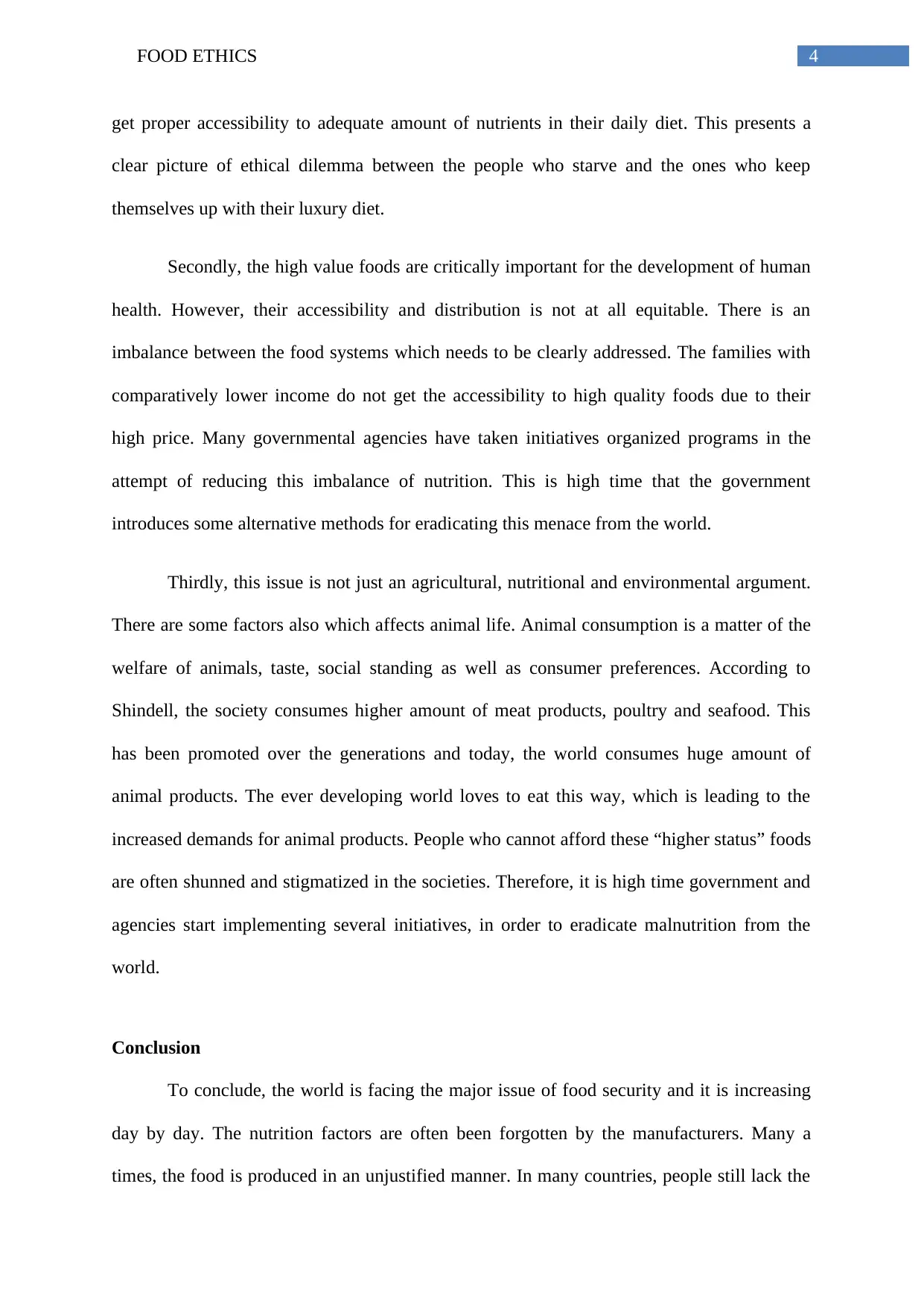
4FOOD ETHICS
get proper accessibility to adequate amount of nutrients in their daily diet. This presents a
clear picture of ethical dilemma between the people who starve and the ones who keep
themselves up with their luxury diet.
Secondly, the high value foods are critically important for the development of human
health. However, their accessibility and distribution is not at all equitable. There is an
imbalance between the food systems which needs to be clearly addressed. The families with
comparatively lower income do not get the accessibility to high quality foods due to their
high price. Many governmental agencies have taken initiatives organized programs in the
attempt of reducing this imbalance of nutrition. This is high time that the government
introduces some alternative methods for eradicating this menace from the world.
Thirdly, this issue is not just an agricultural, nutritional and environmental argument.
There are some factors also which affects animal life. Animal consumption is a matter of the
welfare of animals, taste, social standing as well as consumer preferences. According to
Shindell, the society consumes higher amount of meat products, poultry and seafood. This
has been promoted over the generations and today, the world consumes huge amount of
animal products. The ever developing world loves to eat this way, which is leading to the
increased demands for animal products. People who cannot afford these “higher status” foods
are often shunned and stigmatized in the societies. Therefore, it is high time government and
agencies start implementing several initiatives, in order to eradicate malnutrition from the
world.
Conclusion
To conclude, the world is facing the major issue of food security and it is increasing
day by day. The nutrition factors are often been forgotten by the manufacturers. Many a
times, the food is produced in an unjustified manner. In many countries, people still lack the
get proper accessibility to adequate amount of nutrients in their daily diet. This presents a
clear picture of ethical dilemma between the people who starve and the ones who keep
themselves up with their luxury diet.
Secondly, the high value foods are critically important for the development of human
health. However, their accessibility and distribution is not at all equitable. There is an
imbalance between the food systems which needs to be clearly addressed. The families with
comparatively lower income do not get the accessibility to high quality foods due to their
high price. Many governmental agencies have taken initiatives organized programs in the
attempt of reducing this imbalance of nutrition. This is high time that the government
introduces some alternative methods for eradicating this menace from the world.
Thirdly, this issue is not just an agricultural, nutritional and environmental argument.
There are some factors also which affects animal life. Animal consumption is a matter of the
welfare of animals, taste, social standing as well as consumer preferences. According to
Shindell, the society consumes higher amount of meat products, poultry and seafood. This
has been promoted over the generations and today, the world consumes huge amount of
animal products. The ever developing world loves to eat this way, which is leading to the
increased demands for animal products. People who cannot afford these “higher status” foods
are often shunned and stigmatized in the societies. Therefore, it is high time government and
agencies start implementing several initiatives, in order to eradicate malnutrition from the
world.
Conclusion
To conclude, the world is facing the major issue of food security and it is increasing
day by day. The nutrition factors are often been forgotten by the manufacturers. Many a
times, the food is produced in an unjustified manner. In many countries, people still lack the
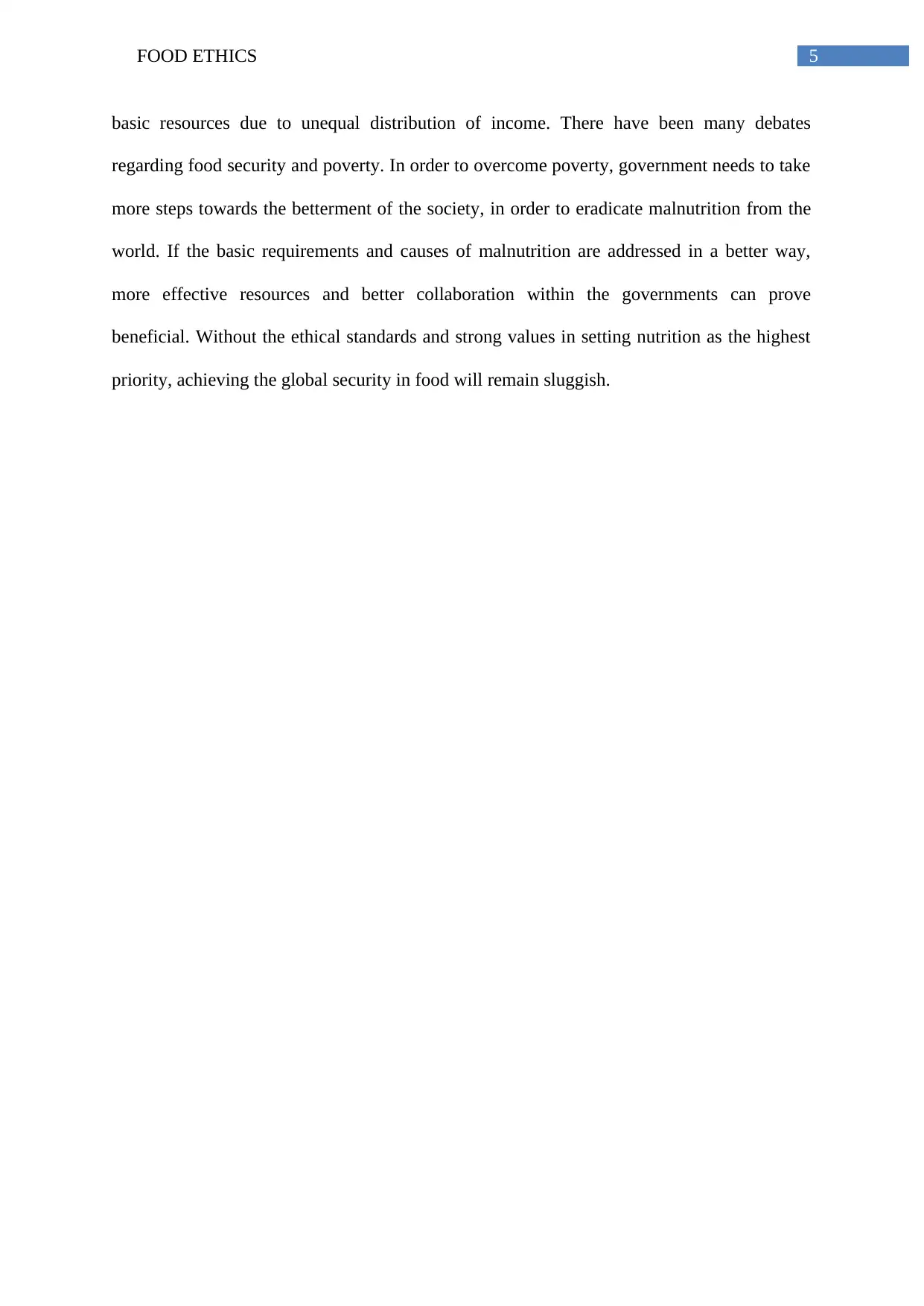
5FOOD ETHICS
basic resources due to unequal distribution of income. There have been many debates
regarding food security and poverty. In order to overcome poverty, government needs to take
more steps towards the betterment of the society, in order to eradicate malnutrition from the
world. If the basic requirements and causes of malnutrition are addressed in a better way,
more effective resources and better collaboration within the governments can prove
beneficial. Without the ethical standards and strong values in setting nutrition as the highest
priority, achieving the global security in food will remain sluggish.
basic resources due to unequal distribution of income. There have been many debates
regarding food security and poverty. In order to overcome poverty, government needs to take
more steps towards the betterment of the society, in order to eradicate malnutrition from the
world. If the basic requirements and causes of malnutrition are addressed in a better way,
more effective resources and better collaboration within the governments can prove
beneficial. Without the ethical standards and strong values in setting nutrition as the highest
priority, achieving the global security in food will remain sluggish.
⊘ This is a preview!⊘
Do you want full access?
Subscribe today to unlock all pages.

Trusted by 1+ million students worldwide
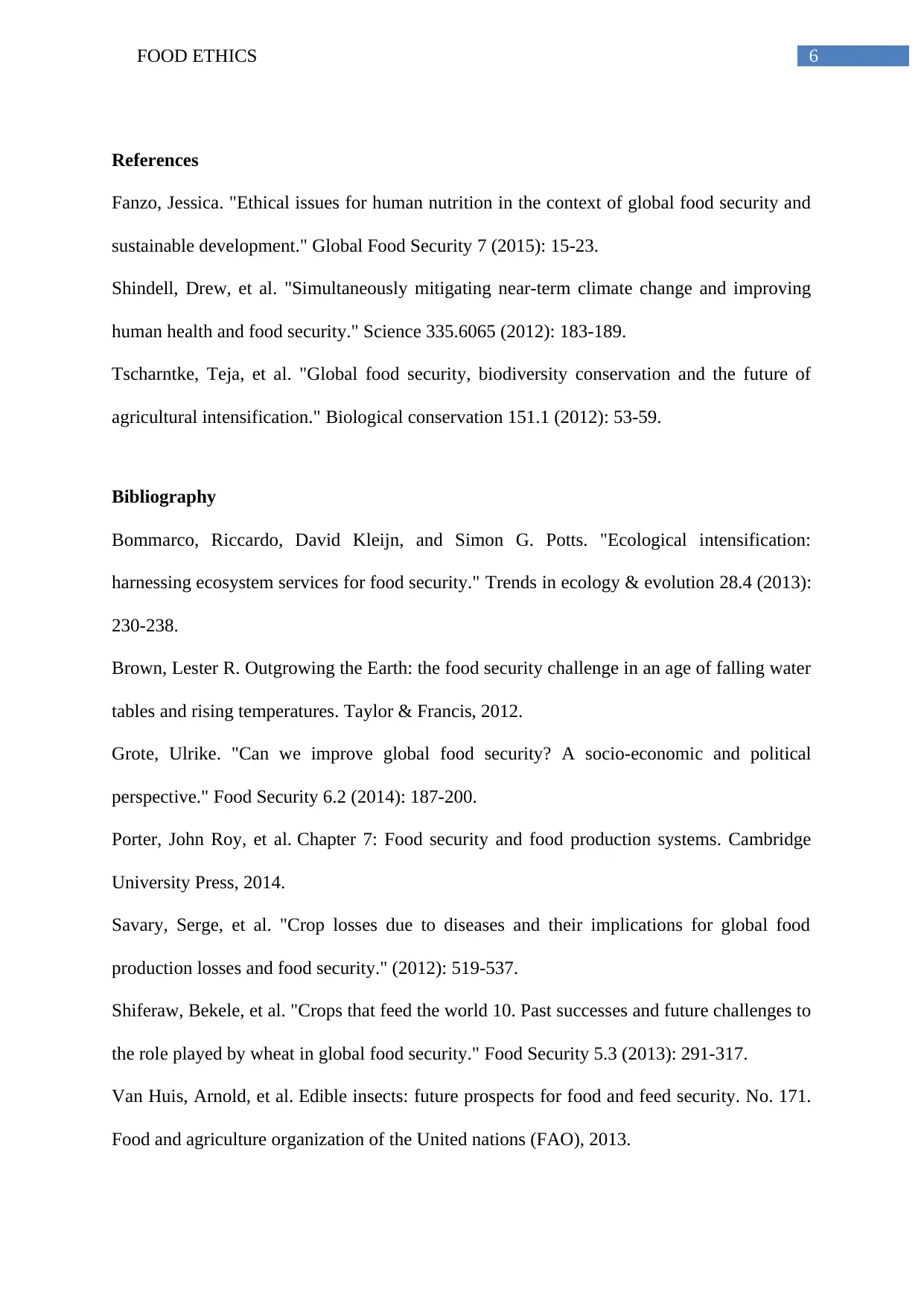
6FOOD ETHICS
References
Fanzo, Jessica. "Ethical issues for human nutrition in the context of global food security and
sustainable development." Global Food Security 7 (2015): 15-23.
Shindell, Drew, et al. "Simultaneously mitigating near-term climate change and improving
human health and food security." Science 335.6065 (2012): 183-189.
Tscharntke, Teja, et al. "Global food security, biodiversity conservation and the future of
agricultural intensification." Biological conservation 151.1 (2012): 53-59.
Bibliography
Bommarco, Riccardo, David Kleijn, and Simon G. Potts. "Ecological intensification:
harnessing ecosystem services for food security." Trends in ecology & evolution 28.4 (2013):
230-238.
Brown, Lester R. Outgrowing the Earth: the food security challenge in an age of falling water
tables and rising temperatures. Taylor & Francis, 2012.
Grote, Ulrike. "Can we improve global food security? A socio-economic and political
perspective." Food Security 6.2 (2014): 187-200.
Porter, John Roy, et al. Chapter 7: Food security and food production systems. Cambridge
University Press, 2014.
Savary, Serge, et al. "Crop losses due to diseases and their implications for global food
production losses and food security." (2012): 519-537.
Shiferaw, Bekele, et al. "Crops that feed the world 10. Past successes and future challenges to
the role played by wheat in global food security." Food Security 5.3 (2013): 291-317.
Van Huis, Arnold, et al. Edible insects: future prospects for food and feed security. No. 171.
Food and agriculture organization of the United nations (FAO), 2013.
References
Fanzo, Jessica. "Ethical issues for human nutrition in the context of global food security and
sustainable development." Global Food Security 7 (2015): 15-23.
Shindell, Drew, et al. "Simultaneously mitigating near-term climate change and improving
human health and food security." Science 335.6065 (2012): 183-189.
Tscharntke, Teja, et al. "Global food security, biodiversity conservation and the future of
agricultural intensification." Biological conservation 151.1 (2012): 53-59.
Bibliography
Bommarco, Riccardo, David Kleijn, and Simon G. Potts. "Ecological intensification:
harnessing ecosystem services for food security." Trends in ecology & evolution 28.4 (2013):
230-238.
Brown, Lester R. Outgrowing the Earth: the food security challenge in an age of falling water
tables and rising temperatures. Taylor & Francis, 2012.
Grote, Ulrike. "Can we improve global food security? A socio-economic and political
perspective." Food Security 6.2 (2014): 187-200.
Porter, John Roy, et al. Chapter 7: Food security and food production systems. Cambridge
University Press, 2014.
Savary, Serge, et al. "Crop losses due to diseases and their implications for global food
production losses and food security." (2012): 519-537.
Shiferaw, Bekele, et al. "Crops that feed the world 10. Past successes and future challenges to
the role played by wheat in global food security." Food Security 5.3 (2013): 291-317.
Van Huis, Arnold, et al. Edible insects: future prospects for food and feed security. No. 171.
Food and agriculture organization of the United nations (FAO), 2013.
1 out of 7
Related Documents
Your All-in-One AI-Powered Toolkit for Academic Success.
+13062052269
info@desklib.com
Available 24*7 on WhatsApp / Email
![[object Object]](/_next/static/media/star-bottom.7253800d.svg)
Unlock your academic potential
Copyright © 2020–2026 A2Z Services. All Rights Reserved. Developed and managed by ZUCOL.



